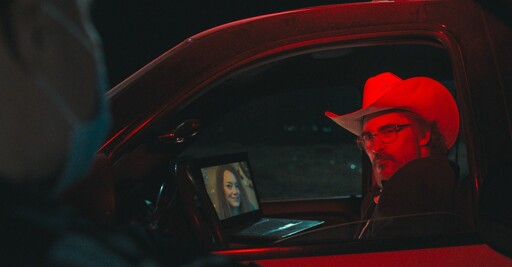After the COVID-19 outbreak began, the internet seemed to offer the thinnest of silver linings. Zoom kept kids in class, sort of. Celebrations—birthday parties, anniversaries—involved “socializing” in multiplayer games. Tech companies built applications for contact tracing to help forecast the pandemic’s spread. The industry eagerly welcomed its novel reputation as a portal to normalcy, for those who could access these opportunities. “The world has faced pandemics before,” Mark Zuckerberg wrote in a column for The Washington Post in April 2020, “but this time we have a new superpower: the ability to gather and share data for good.”
The film Eddington, now in theaters, gleefully rebukes Zuckerberg’s assertion. Written and directed by Ari Aster—the filmmaker behind Hereditary, Midsommar, and Beau Is Afraid—the neo-Western thriller is set during the early days of COVID’s spread in the United States. But rather than explore the impact of the coronavirus, the movie studies the misinformation, paranoia, and outrage that grew amid the internet’s dominance during social isolation. The small town of Eddington, New Mexico, becomes a literal battleground for its locals; they are overcome with the fear fomented by what they’ve seen on their screens. The movie is nasty and cynical—and also eerily accurate in its rendering of the digital reality of pandemic life. Eddington captures what happens when a community can’t log off: people becoming stupefied by the illusion of connection, and muting logic in the process.
Eddington isn’t the first film to take advantage of virtual world-building by incorporating social-media feeds and messaging apps into its visuals. But it does so in a way that makes the online world feel like it’s bleeding into the characters’ daily lives. Joe (played by Joaquin Phoenix), the town’s sheriff, is introduced via a video he’s watching on his phone; the YouTube page fills the frame until the camera zooms out to reveal him as the viewer. His conspiracy-theorist mother-in-law prints out “news” articles that she believes prove her points, reads them out loud, and chatters away about what she’s convinced Joe and his wife, Louise (Emma Stone), refuse to see. While running for mayor against the incumbent, Ted (Pedro Pascal), Joe blares his speeches over his police vehicle’s loudspeaker, creating a chaotic soundscape evoking a crisis-driven news feed.
[Read: Why Ari Aster freaks people out]
Among all this incessant noise are people whose digital personas dramatically contrast with who they are offline: Ted and his teenage son can barely stand each other, but in a campaign ad, they embrace warmly. Joe is celebrated on Facebook after defending a man who refused to wear a mask in a grocery store, but a rally attracts just a handful of supporters. Louise becomes obsessed with Vernon (Austin Butler), an influencer with a cultlike following, and disappears for long stretches of time, but Joe doesn’t register her fixation until he spots a comment she left under one of Vernon’s videos. Dread permeates Eddington: When Joe and his deputies watch a clip of an attack on a police precinct instigated by militant protesters, they never check the provenance of the footage; they just begin to arm themselves.
Research has shown that spending time on social media isn’t necessarily bad; users can generate a sense of kinship by actively participating in discussions and offering feedback and support. But that finding seemed to hold more weight prior to 2020, when the internet existed in tandem with people’s fuller lives. For the characters in Eddington, as it was for many of us living in America that year, there is nowhere to turn to but the conspiratorial thinking, heated debates, and endless updates online.
At one point, Joe barrels through a crowd of people chanting social-justice slogans while brandishing a ring light like it’s a weapon—an absurd image that conveys the disconnect between his actual and digital lives. Joe is a meek man: He struggles to express himself to his wife, who prefers not to be touched by him; he’s desperately outmatched in the mayoral race by the popular Ted; and only his two deputies seem to respect his authority as sheriff. For him, the emergency becomes an opportunity to project a more confident version of himself online. Yet in his quest to become Eddington’s most admired townsperson, Joe ends up trapped in a nightmare of his own making. “Is this what I’m supposed to do?” he cries when violence breaks out. Nobody answers, because nobody knows; his reality has become a void.
[Read: The year that changed the internet]
Joe’s despair reminded me of a conversation my colleague Charlie Warzel had with the writer and technology theorist L. M. Sacasas in 2022. They’d discussed why being on the internet can make people feel stuck in a loop of doom and confusion. Sacasas explained that the present is never the point of social-media engagement—that posting requires being reactive, thereby turning social-media users into the perfect vessels for propagating conflict. “What we’re focused on is not the particular event or movement before us, but the one right behind us,” Sacasas said then. “As we layer on these events, it becomes difficult for anything to break through.” Information, as a result, becomes abstracted into tangents. “We’re caking layers of commentary over the event itself,” Sacasas added, “and the event fades.”
In Eddington, COVID becomes a mere footnote to the events unfolding throughout the town—Joe doesn’t even check his test results when he starts exhibiting symptoms. What he continually responds to instead is the stress built up as a result of the pandemic; he’s left playing catchup to scuffles happening around Eddington, unraveling emotionally as the days pass. The film never interrogates why the early pandemic led to so many ideological conflicts, but it suggests that the prognosis is bleak for those who continue to venture too far into the internet’s noxious rabbit holes. Being too online, in other words, can be its own kind of sickness.
From The Atlantic via this RSS feed


